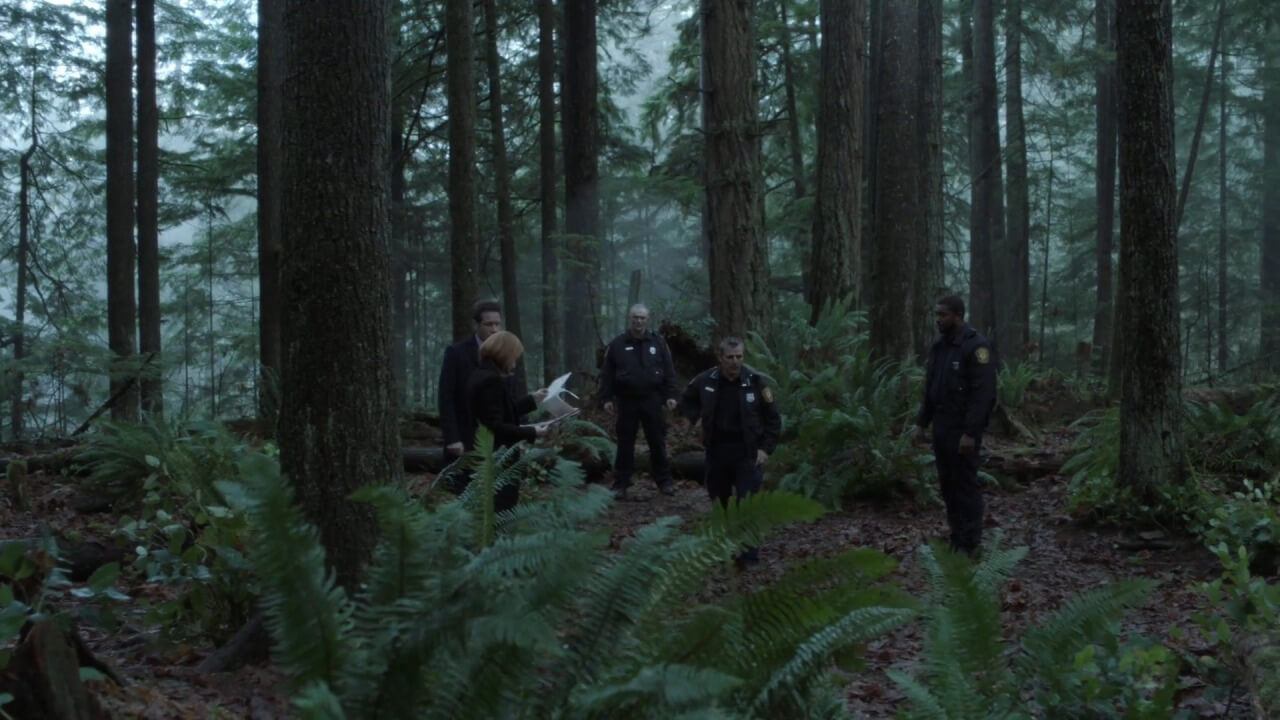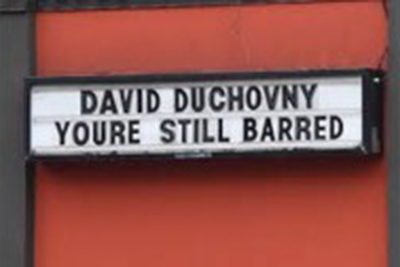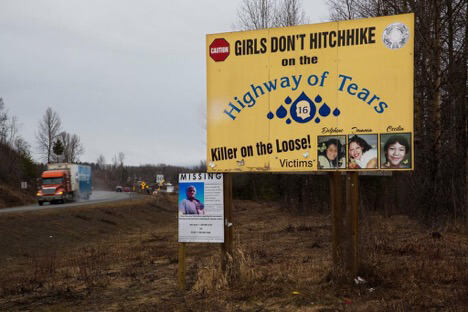I Don't Want to Believe
Brad Phillips
July 14, 2020
Part 1: Less Serious
I recently discovered that—unlike in my twenties—at 46 years old I am able to spend innumerable hours watching The X-Files unassisted by marijuana.
This came as a complete shock to me. To use what is likely the most nauseating portmanteau of the last few years, I successfully, beginning January 1st of this year, binge-watched the entire series, finally, (blessedly) completing this absurdly masochistic, self-assigned journey in early March. Due to the absence of marijuana’s clouding effect, I’ve been able to reflect upon what compelled me to sit through this classic and once wildly popular paranormal procedural, including the thoroughly unredeemable (and perhaps inexcusable) eighth and ninth seasons, seasons no one else I know managed to endure.
Over the last three months, two things have happened to me. Firstly, I’ve come to recognize my younger self in the character of Agent Fox Mulder, and feel shame appropriate to such an identification. Secondly, I’ve entered that most dangerous of all psychological terrain: nostalgia.
The first season of the program aired in 1993, the year I turned 19 and dropped out of college. It ended in 2002, the year I decamped to Vancouver (where the show was filmed for the first six of its nine years)1 to escape my failed first marriage, along with other factors which had made life in Toronto unbearable. The year Fox Mulder and his arch-skeptical, permanently beleaguered2 partner Dana Scully put an end to their nine-year-long investigation into the paranormal, I sought to rebuild my life from scratch in a city I knew almost nothing of, and absolutely no one in.

Crossing the country by plane one night in late October—just months after a stunningly unwise marriage—I told none of my friends I was leaving town. I placed myself in a homemade witness protection program without an overseer; a decision that rendered me more vulnerable than ever, as I’d always been and still was the most imminent threat to my own well-being. It remains my finest Irish exit. It took almost a year for my friends to discover where I’d moved. On The X-Files, Mulder would often leave Scully holding the bag while he set off alone in search of “the truth.” This made him a bad partner. My similar behavior, leaving my future ex-wife and permanent mother to explain what I’d done was further proof—in an overstuffed file—that I was a bad friend. Friends are partners, as are spouses.
I hit my first rock bottom in Toronto, 2002, still grateful for having escaped the Y2K threat unscathed. It was a bottom not unlike the one Fox Mulder hit during season seven, wherein his entire belief system was shattered upon discovering that the extraterrestrials he relentlessly sought (hoping to uncover the truth of his sister Samantha’s abduction when he a child), were instead components of a conspiracy perpetrated by the American government; not technologically advanced gray creatures travelling the universe.
Once in Vancouver, my goal was to understand what had gone wrong with my life, and what part I’d played in that wrongness. As in the series, I found monsters, poor writing, inconsistent narratives and rampant duplicity. As in the series, as soon as I thought I’d solved the mystery of one particular clusterfuck from my past, I found myself embroiled in a new one. On moving to a city with the largest open drug market in North America, my putative quest for self-discovery quickly stopped, and I returned to what I knew best—self-annihilation, addiction, productivity and destructivity. Getting up and falling down had defined my adult life. More specifically, a woman would assist me in getting up, and in her attempts to keep me up, I’d cause that same woman to fall back down with me. Now 46 years old and sober for eight years, I live outside of the X-File that was my life. In revisiting the series, I feel more like a writer providing commentary on a DVD box set of the show instead of feeling like Mulder, or one of the multiform chimeras he and Scully spent nine years pursuing, only to end up with a mutant child and a lengthy contract dispute.
*
People from my personal life paired with their analogous characters from The X-Files, names changed for anonymity:
Agent Fox Mulder - Brad Phillips
Agent Dana Scully - Anastasia Brindamour (my second ex-wife, Vancouver, British Columbia)
FBI Assistant Director Walter Skinner - Dr. Sebastian Valmont (my psychiatrist, Vancouver, British Columbia)
Cigarette Smoking Man - John Phillips, my deceased father
Agent John Doggett - Rodolphe Boulanger (my ex-wife Anastasia’s boyfriend following our divorce in 2012)
*
The first place I lived in Vancouver was a small cottage at the edge of Chinatown, heated only by a wood-burning stove. The rent was just three hundred dollars, which I split with my roommate James, an inscrutable man doing his PhD in psychogeography.3 The Pacific Northwest is sometimes called a spiritual black hole, and is notorious for being the birthplace of more serial killers than anywhere else in the world. Our cottage was surrounded by century bamboo, which we’d often find elderly Chinese chopping down with machetes before sunrise. It was a spooky house, and years later I learned that in the eighties it’d been a shooting gallery in which many people had fatally overdosed. Once during a party my friend Vlad punched a hole in my bedroom wall, revealing a bizarre staircase hidden behind the plaster. We had only a single floor. A house is a body, and this staircase was an organ which served no obvious purpose, unless it provided, in X-Files fashion, passage to some other dimension.
The license plates on cars in Vancouver are stamped with the phrase “Supernatural British Columbia.” The province is said to be home to more Satanists per capita than anywhere else in the world. I once found a mummified coyote under the floorboard of my bedroom after peeling away hardwood panels with my bare hands in a drunken stupor.
Throughout Vancouver’s Chinatown (the only place I lived during my decade there), well-constructed wooden tunnels exist under the streets. They were built during the booming opium scene that existed into the 1930s. Were the police to conduct raids, tenants could lift a floorboard in their kitchen and be on the other side of the neighborhood in ten minutes, reemerging in the kitchen of an uncle, lover, or business partner. On Dunlevy, the street next to my second home, the asphalt had eroded to such an extent that wooden panels were clearly visible. Hip entrepreneurs conducting “authentic tours of historic Vancouver” would stop on our street to photograph them, surrounded by contemporary opiate addicts waiting to rob the tourists of their cameras.
It took less than a year of living in the tropical rainforest that is Vancouver for me to agree that I’d in fact moved to an indisputably supernatural place. Months of blinding fog obscured trees over two thousand years old. Numerous episodes of The X-Files are devoted to the mysteries of the deep sea. It wasn’t uncommon to read stories in the local paper about fishermen catching and releasing sturgeon that had been alive for at least, if not more, one hundred years. Cryptozoology is popular in the Pacific Northwest, as it was on The X-Files. The day I arrived in Vancouver was the beginning of the longest record of uninterrupted rain in over one-hundred years. From my memory it extended into April.
Part of why David Duchovny (Fox Mulder) is not in the last few seasons of The X-Files is a result of his griping about the weather; problems that any resident would complain about amongst friends and family, but object to when uttered from the highly paid mouth of a Hollywood celebrity. Duchovny wanted the show relocated to Los Angeles. Chris Carter, creator of the series, did not. Thus Mulder was essentially written off the show, to be replaced by Agent John Doggett, played by relative unknown Robert Patrick.
David Duchovny is (or was) a self-acknowledged sex addict. My ex-mother-in-law’s best friend, at the time a 55-year-old suburban paralegal, slept with Duchovny. That I know more than a handful of people who’ve slept with Duchovny speaks to the ambition of his addiction. Vancouver is a small city—less than a million people—and there is but one strip club servicing the entire downtown; a legendary, wonderful place called No. 5 Orange. I have, in previous writing, auto-fictively referred to the possibility that a character named “Brad Phillips” may have harbored similar addictive impulses as Duchovny. Certainly the Brad Phillips writing this patronized No. 5 Orange often, pleased it was located only three blocks from his home. I have, in the past, been banned from a handful of establishments. I was never banned from No. 5 Orange. David Duchovny though, was, directly after uttering the following while appearing on Late Night with Conan O’Brien. Duchovny told his somewhat Cro-Magnon interlocutor that Vancouver was a place which has “400 inches of rainfall a day,” and that “It’s kind of like a tropical rainforest without the tropics. More like an ice age rainforest.”
Beyond these gripes on network television, Duchovny would doggedly express his disdain on local radio shows, and wherever else he found a microphone. But his Conan O’Brien appearance was the last straw for Tony Ricci, owner of No 5. Orange. He explained his banning of Duchovny as “defending our city,” and that Duchovny’s comments “just really upset me, and we’ve barred him from here,” finishing with the declarative and impassioned statement: “We can’t stand for this.”
I myself am a big fan of advertisements taken out in newspapers to defame individuals, and wish I’d been living there to have seen this one, taken out by Mr. Ricci, in the Vancouver Province:

There is an element of mystery, particularly to someone familiar with strip clubs, as to what is meant by, “After all we’ve done for you,” “How many things have you got for free?”, and the most mysterious... “How many people have gone out of their way for you?”
Did these queries imply nothing more than a few free bottles of Veuve Clicquot, or was it much more? A little “bending of the rules” to satiate Duchovny’s Dionysian needs? Could he have been allowed to stay after hours for private dances? Were there complimentary threesomes? Foursomes? Full-blown orgies?
I’m also a fan of text placed on marquees intended to defame individuals, and wish I’d been living in Vancouver when Duchovny, who was in town for another event, was reminded of the following on the marquee of the same don’t-shit-on-our-town club.

Part 2: More Serious
Soon after I moved to Vancouver I met my second wife Anastasia. She was beautiful, I was in a new city—it’s a fairly simple script in line with my nature at 28. While I can’t remember with perfect recall what I was like at that age, I have a fair idea of what I was like ten years later. Gillian Anderson (Dana Scully) is, on The X-Files, assigned to be Fox Mulder’s partner in order to spy on him, to debunk his theories and, essentially, undermine him. Mulder, already having been obsessed for years with whatever “truth” he thought was “out there,” doesn’t give his new partner much attention, or credit. Over the course of the series, Scully becomes both Mulder’s babysitter and maid. His own putative genius runs the episodes, and his instincts are sacrosanct.
I know that in my early thirties, succeeding as an artist and not yet having gone through an experience so utterly ego-crushing that I might’ve questioned my own instincts, I behaved somewhat similarly with my ex-wife. I doubt I’d have done this intentionally; it would simply have been the byproduct of my nature as a subconsciously sexist, most likely toxic young white male. On the television show, someone calls Mulder with a report that an alien ship has been seen in, say, Abilene. Before she knows it, Mulder is on the way to the airport, bags in hand, looking back at Scully to tell her to “man the fort” or “cover for me.” Theirs was not a true partnership.
Sometimes I laughed rewatching the series. Nowhere in the world looks like British Columbia. Yet in every state that Mulder and Scully visited in search of the paranormal, that state contained the flora and fauna of the tropical rainforest that is Vancouver. Although they only exist along the coast of central California up to Oregon (and then into British Columbia) giant redwood trees appeared everywhere the agents went, including a haunted circus in Texas.

Watching these bloopers brought about crippling nostalgia. I missed the old growth rainforest. I missed the alleys and side streets that X-Files producers paid junkies and the homeless to leave, so that they could film a scene. Alleys and side streets where I used to party. I missed everything I saw that had once been home. But my home had always been a bad place for me, from the moment I got off the airplane in 2002. The drug scene there was as soft as a new duvet. I fell right into it. Vampires appear in a few episodes of The X-Files, none of them as scary as the vampires and their victims I knew and spent time with, that I myself became, while living in the lower east side of Vancouver’s spiritual black hole.
Mulder and Scully always sought monsters. Had the production company read local newspapers, they could’ve found monsters far more frightening than any conjured on the show. Stretching for 450 miles through an extremely remote part of British Columbia, populated almost entirely by aboriginal people, is an asphalt tunnel into hell called The Highway of Tears. Documented murders and disappearances of women along this highway date back to 1970; though earlier ones were surely not recorded. Due to poverty and low rates of car ownership, the long distances required to get to work or medical centers, most people are forced to hitchhike. Women are particularly vulnerable, not only due to an epidemic of domestic abuse, but to the stultifying boredom and governmental neglect which has caused a widespread drug and alcohol problem.
Signs along the highway beg young women not to hitchhike. They are paid for by local band councils; not one sign has been erected by the provincial government to warn women of the same dangers. According to the Canadian government, close to a hundred women have been murdered along this highway since 1970. According to aboriginal activists (and essentially everyone not working for a government paycheck) the number of missing and murdered women is in the high hundreds.
The predominant theory is that this slaughter of aboriginal women isn’t the work of a single individual. Instead, due to multiform reasons making this highway ideal for predators (soft soil and carnivorous animals which help to disperse evidence), many believe it is a hunting ground for generations of serial killers. A place to practice their work in complete privacy, knowing that aboriginal women are seen as subhuman in Canada, and that their deaths will not be investigated.
More than 20 years later, watching the program again and having known people who’ve lost loved ones on that highway, I felt the sad pull of irony that in this beautiful province, which truly is supernatural, Agent Fox Mulder searched for the truth in the strangest places, and really did want to believe. And throughout the six years he was there, horribly believable truths lurked on services roads off shooting locations. Of all the monsters created by a Hollywood production company, none could compare to the ones that were out there at the time, killing young girls, and the ones that are still out there today.
As I write this, my life has changed dramatically multiple times. While there I was a drug addict and, mostly, an asshole. The version of myself that Vancouver saw (a more monstrous version) no longer exists, so my life and myself have changed to the extent that I no longer exist as I did out west. There was a certain horror in rewatching the show, knowing that during the almost-decade hiatus I took from watching it, new monsters were created like golems from the mud of the Pacific Northwest similar to the ones that appeared throughout the series, and that even today, waiting to send this to my editor, another woman is at risk of being pulled into the forest by something far darker than Mulder could ever have believed.
- Appropriately, I have very few memories of the last three years of my life in Vancouver.
-
A passing familiarity with the series is helpful in the reading of this essay.